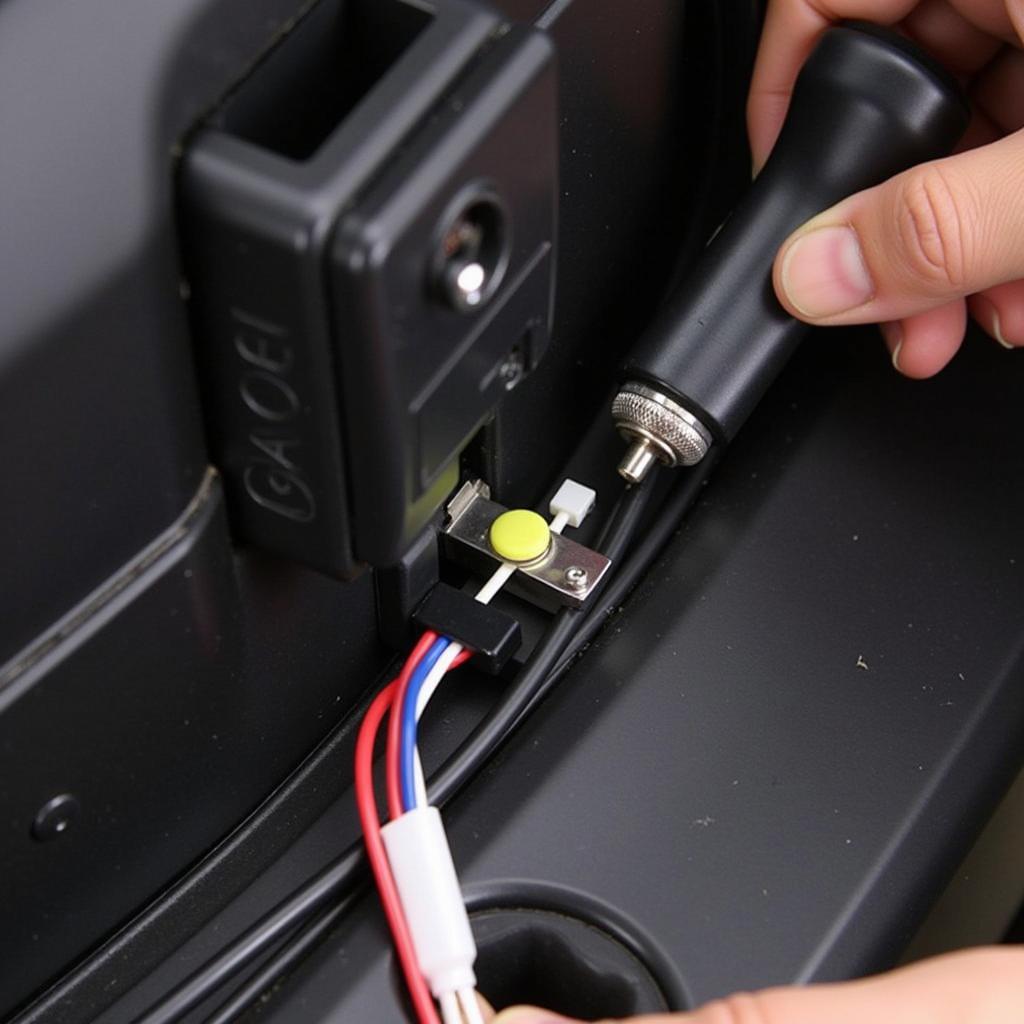Understanding what anti-theft means in car insurance can significantly impact your premiums. It refers to devices and systems in your vehicle that deter theft, which can range from basic factory-installed alarms to sophisticated GPS tracking devices. Knowing how these systems are categorized and how they influence your insurance costs can save you money and provide peace of mind.
Decoding Anti-Theft Discounts: How Your Car’s Security Impacts Your Premium
Anti-theft devices are often grouped into different tiers by insurance providers, each offering varying levels of discount. The most basic systems, such as a standard alarm or steering wheel lock, generally qualify for a smaller discount. More advanced systems like immobilizers, which prevent the engine from starting without the correct key, can lead to higher discounts.  Car Anti-Theft Device Installation
Car Anti-Theft Device Installation
What Types of Anti-Theft Devices Qualify for Discounts?
The types of anti-theft devices that qualify for insurance discounts can vary between insurance companies. Always check with your specific provider for a definitive list, but common examples include: car alarms, steering wheel locks, kill switches, immobilizers, VIN etching, and GPS tracking systems. Some insurers might offer discounts for multiple anti-theft devices installed in the same vehicle, further reducing your premium. Understanding the specifics of each device and its impact on your insurance policy is crucial for making informed decisions.
Maximizing Your Savings: Tips for Leveraging Anti-Theft Features
Understanding how to maximize your savings with anti-theft features involves more than just installing a device. Documenting your vehicle’s security system with your insurance company is vital. Provide proof of installation and any relevant certifications to ensure you receive the appropriate discount. Regularly review your policy to ensure the discount is applied correctly, and inquire about potential discounts for upgrading your system.
How to Prove You Have an Anti-Theft Device to Your Insurer
When you install a new anti-theft device, providing proof of installation to your insurer is essential for obtaining the discount. This typically involves submitting documentation such as installation receipts, device certifications, and sometimes even photographs of the installed system. Maintain clear records of these documents for future reference. Proactively communicating with your insurance agent about your vehicle’s security features can streamline the process and ensure you receive the maximum applicable discount.
“Having a comprehensive anti-theft system not only protects your vehicle but can also significantly lower your insurance premiums. It’s a win-win situation for car owners,” says John Davis, Senior Automotive Security Consultant at SecureRide Solutions.
Beyond the Basics: Exploring Advanced Anti-Theft Technologies
While basic alarms and immobilizers are effective deterrents, advanced anti-theft technologies offer enhanced protection. GPS tracking systems, for example, allow for vehicle recovery in case of theft. Biometric security systems utilize fingerprint or facial recognition to restrict access to the vehicle. These advanced systems often come with additional features like remote vehicle monitoring and control, adding another layer of security and convenience. sonata 2012 brake warning
Are Aftermarket Anti-Theft Systems Worth the Investment?
Investing in aftermarket anti-theft systems can be beneficial, particularly for older vehicles that lack factory-installed security features. The cost of these systems varies depending on complexity and features, but the potential savings on insurance premiums and the added peace of mind can justify the expense. When choosing an aftermarket system, consider factors like reliability, ease of use, and compatibility with your vehicle’s electrical system.
“Investing in a quality anti-theft system is a smart move, especially in high-theft areas. It’s a preventative measure that can save you a lot of hassle and expense in the long run,” adds Maria Sanchez, Lead Insurance Advisor at AutoProtect Insurance.
Conclusion
“What does anti-theft mean in car insurance?” It means significant savings and added security. Understanding the different types of anti-theft devices and how they impact your insurance premiums empowers you to make informed decisions. By proactively investing in and documenting your vehicle’s security features, you can protect your car and reduce your insurance costs, maximizing your peace of mind.
FAQ
- Do all car insurance companies offer anti-theft discounts? Most do, but the specific discounts and qualifying devices can vary. Contact your insurer for details.
- How much can I save with an anti-theft discount? The discount amount varies depending on the type of device and the insurance company.
- Is it worth installing an aftermarket anti-theft system? It can be, especially for older vehicles, but consider the cost versus potential savings.
- What proof do I need to submit to my insurance company? Typically, installation receipts, device certifications, or photographs of the installed system are required.
- What are the most effective anti-theft devices? GPS tracking systems, immobilizers, and advanced alarm systems offer comprehensive protection.
- Can I get a discount for multiple anti-theft devices? Some insurance companies offer discounts for multiple devices. Check with your provider.
- What should I do if my anti-theft device malfunctions? Contact a qualified technician for repairs and inform your insurance company.

